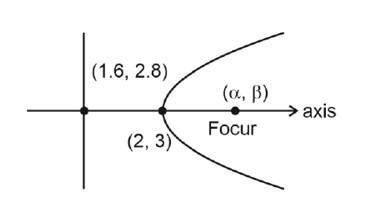The differential equation satisfied by the system of parabolas y² = 4a(x + a) is:
The differential equation satisfied by the system of parabolas y² = 4a(x + a) is:
Given the family of parabolas y² = 4a (x+a).
Differentiate with respect to x:
2y (dy/dx) = 4a
a = (y/2) (dy/dx)
Substitute a back into the original equation:
y² = 4 * (y/2) (dy/dx) * [x + (y/2) (dy/dx)]
y² = 2y (dy/dx) * [x + (y/2) (dy/dx)]
y = 2 (dy/dx) * [x + (y/2) (dy/dx)]
y = 2x (dy/dx) + y (dy/dx)²
y (d
Similar Questions for you
ae = 2b
Or 4 (1 – e2) = e2
4 = 5e2 ->
If two circles intersect at two distinct points
->|r1 – r2| < C1C2 < r1 + r2
| r – 2| < < r + 2
|r – 2| < 5 and r + 2 > 5
–5 < r – 2 < 5 r > 3 … (2)
–3 < r < 7 … (1)
From (1) and (2)
3 < r < 7
x2 – y2 cosec2q = 5
x2 cosec2q + y2 = 5
and &n

Slope of axis =
⇒ 2y – 6 = x – 2
⇒ 2y – x – 4 = 0
2x + y – 6 = 0
4x + 2y – 12 = 0
α + 1.6 = 4 ⇒ α = 2.4
β + 2.8 = 6 ⇒
Taking an Exam? Selecting a College?
Get authentic answers from experts, students and alumni that you won't find anywhere else.
On Shiksha, get access to
Learn more about...

Maths Ncert Solutions class 11th 2026
View Exam DetailsMost viewed information
SummaryDidn't find the answer you were looking for?
Search from Shiksha's 1 lakh+ Topics
Ask Current Students, Alumni & our Experts
Have a question related to your career & education?
See what others like you are asking & answering
